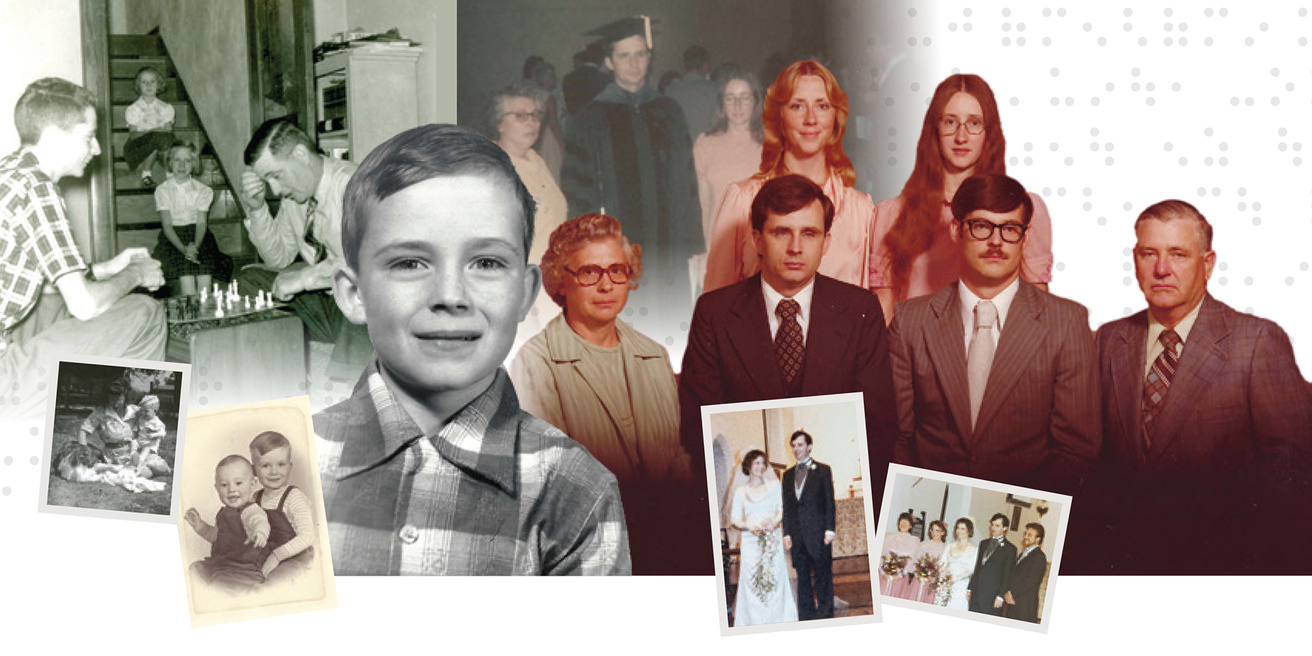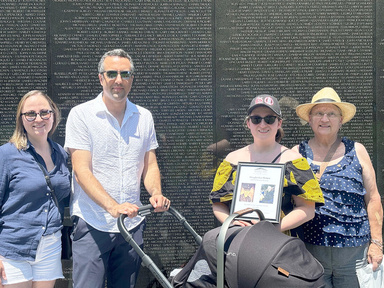I don’t know if we each have a destiny, or if we are all just floating around accidental like on a breeze, but I, I think maybe it’s both.”– Forrest Gump

Was it destiny or random chance that defined the remarkable life of Doug Slotten?
Slotten’s “feather” lifted him from his parents’ farm home in Barnum, Iowa to the University of Iowa to the financial district of Chicago to the battlefields of Vietnam (where he lost his eyesight and half of his right leg) to law school at Arizona State University to a job with the federal government in Washington, D.C., and, eventually, to his burial at Arlington National Cemetery.
Slotten died of prostate cancer in 2023, at his home in Chevy Chase, Maryland, surrounded by family—his wife Elin, twin daughters Chelsi and Kirsten, sisters Deanna and Nancy, and brother Lyle. He was 76.
Weeks after his passing, the circle of life continued with the birth of Slotten’s grandson and namesake, Maxwell Douglas Pavlovic, to daughter Kirsten and husband, Alex.
“I think my dad would be super happy and proud,” Kirsten said. “Max has his chin (and mine!) and also his furrowed brow when he’s thinking really hard or displeased by something.”
Vietnam
It was a December day in 1970 when 23-year old Army Sgt. Douglas Slotten stepped on a land mine while on reconnaissance patrol in South Vietnam, attached to the 101st Airborne Division. He was quickly evacuated to a hospital ship, but doctors were unable to save his sight and were forced to amputate the lower half of his right leg.
Call it his destiny or the random nature of life, this much is true: The injuries changed the course of Slotten’s life and all the lives he touched for the next 53 years.
Slotten, a recipient of the Purple Heart, set out with resolve and courage to a future far removed from the farm where he grew up—a future that took him as a blind amputee to law school in Arizona, an impactful 45-year career with the Federal Communications Commission in the nation’s capital, and a marriage of 37 years.
Heroes are buried at Arlington—and Slotten was a hero—but in a larger way than what happened to him in Vietnam.
“While many may see Douglas as a war hero, I see him as a life hero,” said his sister, Deanna. “What makes him so special is not what happened to him in war, but rather what he did after that and how he did it. He was not bitter, didn’t feel sorry for himself. Instead, he set about figuring out how to continue with the dreams he had and then pursued them with tenacity and great success.”
The arrival of Veterans Day 2023 sparked a memory from daughter Chelsi:
“He used to come in our school classrooms to talk on Veterans Day on what he did in the Vietnam War,” she said. “One of the stories he would tell was being on a hospital ship after he was injured and an Army chaplain coming in to talk to him. The chaplain had a bit of a prepared speech on the meaning of life and such and started in on the speech. My dad interrupted and said, ‘You’re wasting your time. A lot of people say that. You don’t understand. I was lucky enough to be born in a free country. This was my price that I’m willing to pay so that my family can live in a free country.’ I don’t know if it ever occurred to him to feel bad or resentful. He didn’t let it define his life or purpose.”

Early Life
Slotten was born in Fort Dodge, Iowa, on Dec. 22, 1946, to Leo Russell Slotten and Evelyn Woods Slotten, who farmed. He was the oldest of four children.
After graduating from Northwest Webster High School in 1965, Slotten attended the University of Iowa where he earned a bachelor’s degree in accounting in 1969. Friends say his propensity at poker and ironing shirts for fellow students helped finance his education. He remained a dedicated Hawkeye sports fan, especially basketball, for the rest of his life.
His first job out of Iowa City was in Chicago with major accounting firm Ernst & Ernst (now known as EY), but his employment was interrupted by the draft. He attended Army basic training at Fort Polk, Louisiana., and then advanced infantry training. Slotten was promoted to sergeant (E-5) and after assignments in Georgia and Kansas, got his orders for Vietnam. He shipped out Nov. 7, 1970.
Reconnaissance Mission
Five weeks into Vietnam, on Dec. 14, 1970, he was with a reconnaissance platoon assigned to the 101st airborne Division that was landed by helicopter on a hilltop in hazardous territory north of Hue.
“We were checking the area,” he recalled in a 1971 interview with the Des Moines Tribune. “I went off to one side, looking for signs of the enemy. Our group had found one mine. I found the second. I stepped on it.”
Within an hour he was flown in a military helicopter to the USS Sanctuary, a Navy hospital ship, where he stayed 17 days. After spending New Years Eve at the Da Nang airport, he was flown to Walter Reed Hospital in Washington.
He was given home leave and returned to Iowa with crutches and a wheelchair. “It was a happy time, and it was a hard time,” Slotten told Lois Johnson of The [Fort Dodge] Messenger in a Nov. 5, 1971, interview. “It was harder for the folks than for me. I’d had a month to adjust. They hadn’t. I had ideas about how to function. They had to learn.”
CPA Exam
Slotten returned to Walter Reed—where he learned to read Braille—and then entered Hines Veterans Hospital in Chicago for intensive training in how to live as a blind person and how to walk with an artificial leg. He returned to the University of Iowa as a special student, took three courses, and remarkably, completed the fourth and final section of the Certified Public Accountant test.
Slotten next decided to pursue an earlier ambition of entering law school. He applied and was admitted to Arizona State University School of Law, becoming the school’s first completely blind law student. With a Braille typewriter and several tape recorders, while living alone in a student-filled apartment complex in Tempe, he graduated cum laude and in August 1975 joined the Federal Communications Commission (FCC) as an attorney.
The FCC
He would live the rest of his life in the Washington D.C. area. Three years after joining the FCC, he was named Outstanding Handicapped Federal Employee of the Year. He commuted to work by bus and train for most of his career, before taking cabs and Ubers in his later years. He retired in 2021.
Slotten’s service to the FCC was noted by FCC Chairwoman Jessica Rosenworcel following his death.
“Doug’s contributions helped shape the telecommunications marketplace and set the stage for the broadband revolution,” she said, adding that he was “a kind, patient, and selfless teacher—he was always generous with his knowledge and his friendship. Doug also reminded all of us that life can hold great things, even in the face of challenges. He will continue to inspire us, as long as we hold his memory close.”

Family Life
Slotten’s family was hugely important to him, said his wife Elin Wackernagel-Slotten, and he doted on their twin daughters.
How did they meet? Elin responded, “Doug loved it when people asked us how we met. Doug being Norwegian and a Slotten, he was not one to show emotion, but he would get this little wicked grin and say, ‘a blind date.'” She was a schoolteacher in Chevy Chase, Maryland and the next morning, he sent a dozen red roses to her classroom. Their first date was in February 1986, and they were married eight months later.
His daughter Kirsten Slotten is a senior vice president with Weber Shandwick, a public relations and marketing firm, in San Francisco.
“He wasn’t defined by what happened to him,” she said, “he never let that impact how he approached life. He gave his best at everything he did, whether with the FCC or raising us. He was very committed to people.”
His daughter Dr. Chelsi Slotten is employed by the academic publisher Sage Publications.
“He was the absolute best dad,” she said. “He was there for every ballet recital, riding competition, graduation, help with homework, answering tax questions as we got older. He was there to bounce ideas off of for potential Ph.D. work (he even read along some of my course books with me so we could discuss). If we needed something, he was there for it.”
Saying Goodbye
One of his lifelong friends with whom he went through basic training with, Paul Onerheim, believed Slotten’s death was attributable to his exposure to the defoliant Agent Orange while serving in the Army.
“The risk of prostate cancer is almost doubled for those who served in Vietnam, including a 75% increase in high-risk, aggressive forms of the disease,” he noted.

Onerheim felt so strongly, he contacted the Vietnam Veterans Memorial Fund (VVMF) organization on behalf of his fallen friend.
In June of 2024, Onerheim and Slotten’s family had the privilege of seeing him inducted into the VVMF’s In Memory Honor Roll program in a ceremony at the Memorial in Washington, D.C.
“Doug lived a positive, productive life under circumstances others would say were difficult,” Onerheim said. “Others in his situation would have given up 50 years ago. Not Doug. It was an honor to have been his friend. Doug was a leader, quietly serving others. … Rest in peace, my dear friend. Your work is done.”
This article appeared in the 2024 issue of Iowa Ledger.
An extended version appeared in The Messenger in 2023. It has been reprinted with permission from the author, with edits by Tory Brecht and Amanda May.
Photographs courtesy of the Slotten family.
